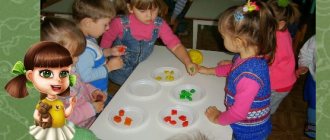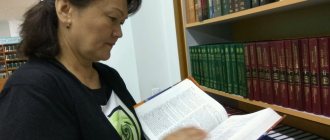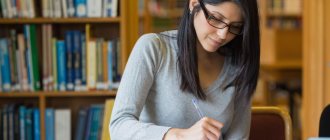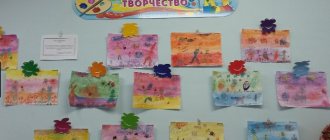Sample topics for self-education for educators
1. Activation of the vocabulary of children of the younger age group.2. The influence of educational activities directly on the play of young children.
3. The influence of oral folk art on the development of speech in children 3-4 years old.
4.Education of preschool children through work.
5. Education of moral qualities of preschool children through Russian folk tales.
6. Gender education of preschool children in a kindergarten.
7. Didactic game as a form of teaching young children.
8. Didactic games in teaching children the basics of mathematics.
9.Spiritual and moral education of preschool children.
10.Spiritual and moral education of children through reading fiction.
11.Game as a means of educational activity in the context of the implementation of the Federal State Educational Standard.
12.Game as a means of communication for preschoolers.
13. Playing activities of children at the stage of transition from early to preschool childhood.
14.Use of health-saving technologies in the first junior (second junior, middle, senior) group.
15.Use of educational games in mathematics classes with children of primary (middle, senior) preschool age.
16.Use of various non-traditional drawing techniques in working with children 2–3 years old.
17. Personality-oriented approach to the education of preschool children.
18.Methods of forming correct posture and preventing its violation in preschoolers.
19. Folk outdoor games in the physical education of preschoolers.
20. Enriching the social experience of preschoolers.
21.Health-improving gymnastics after a nap, its meaning.
22. System of work in preschool educational institutions for patriotic education.
23. Patriotic education of preschool children through the use of fine arts.
25. Outdoor play as a means of developing speed and dexterity in children of junior (middle, senior) preschool age.
26. Cognitive and research activities of preschool children.
27. Traffic rules for preschoolers.
28. Techniques for activating mental activity in the process of introducing children to nature.
29. Project activities with children of primary (middle, senior) preschool age.
30. Project method in the spiritual and moral education of preschool children.
31.Development of dialogical communication between children in a group of different ages (4-7 years).
32. Development of play activities in young children.
33. Development of communication abilities of older preschoolers through communication with nature.
34.Development of mathematical abilities of preschool children through play activities.
35.Development of fine motor skills of preschoolers.
36.Development of fine motor skills in preschool children through non-traditional drawing techniques.
37. Development of cognitive activity of preschool children.
38. Development of search and research activities of preschoolers in the process of experimentation.
39. Development of speech in children of early and primary preschool age.
40. Rhetoric lessons and speech etiquette as a means of developing the speech of preschoolers.
41.Development of sensory abilities of preschool children.
42.Development of sensory abilities through didactic games.
43.Development of children's creative abilities in visual arts.
Development of children's creative abilities using non-traditional drawing techniques.
44.Development of creative abilities of preschoolers through puppet theater.
45. Speech development of preschool children
46. The role of motor mode for the health of preschool children.
47. The role of play in the physical development and promotion of health of a preschooler.
48. The role of riddles in the development of a preschooler.
49. The role of the family in raising preschool children.
50. Fairy tale as a means of spiritual and moral education of preschool children.
51. Modern approaches to the implementation of the tasks of the educational field “Cognitive development”
.- Modern approaches to the implementation of tasks in the educational field “Speech development”
.- Modern approaches to the implementation of tasks in the educational field “Social and communicative development”
Modern approaches to the implementation of tasks in the educational field “Artistic and Aesthetic Development”
52. Theater - as a means of forming coherent speech in preschoolers.
53.Theatrical activities as a means of developing a child’s creative personality.
54. Physical development of children in play activities.
55. Physical education and health work with children.
56. Formation of communicative qualities in children of junior (middle, senior) preschool age.
57.Formation of communicative qualities in children of senior preschool age through communication with nature.
58. Formation of a culture of health in preschool children.
59. Formation of the beginnings of the ecological culture of preschool children.
60.Formation of the foundations of pedagogical skills.
61.Formation of patriotic feelings in preschoolers.
62.Formation of children's speech in play activities.
63. Fiction as a means of comprehensive development of a preschooler.
64. Artistic and speech development of children through joint theatrical activities of children and parents.
65.Environmental education of children in kindergarten.
66. Ecological development of children in the younger (middle, older) age group.
67. Activity approach in the education of preschool children
68. The influence of the developmental teaching method on the formation of the personality of a preschooler
69.Use of multimedia didactic games in the cognitive development of preschool children
Forms of self-education for preschool teachers
Self-education of a kindergarten teacher is a multifaceted and diverse activity that can be implemented in different forms, the main of which are:
- study regulatory documents, scientific, methodological and special literature;
- study the advanced pedagogical experience that has been accumulated by the preschool education system;
- attend open classes of colleagues and carry out their further analysis;
- develop programs, didactic material, teaching aids;
- participate in various forms of methodological work at different levels;
- try in practice forms, means, methods of teaching and education;
- analyze the results of your own work;
- take advanced training courses.
Self-education of educators complies with state standards and requires maintaining a certain set of documentation. The teacher should create a methodological folder in which he will collect useful and interesting articles on the chosen topic, notes of interest on direct educational activities, examples of fiction, riddles, photographs from events, etc.
Finished works on a similar topic
Course work Self-education of a kindergarten teacher 460 ₽ Abstract Self-education of a kindergarten teacher 250 ₽ Test paper Self-education of a kindergarten teacher 240 ₽
Receive completed work or specialist advice on your educational project Find out the cost
Be sure to develop a work plan for self-education for the academic year, which helps to optimize future activities and bring them into a coherent system. The teacher’s responsibilities are also to regularly fill out a folder for his self-education.
In addition to the annual plan, there is a long-term plan for education, which outlines the work on a particular topic for several years in advance.
Self-education should not be perceived only as filling out notebooks, planning and preparing consultations, designing stands, etc. First of all, it represents stimulation of professional growth, as well as personal development of the teacher.
Self-education plan on the topic: “Formation of the foundations of pedagogical skills” material on the topic
Self-education plan
on the topic: “Formation of the foundations of pedagogical excellence”
Goal: to improve your theoretical level, professional skills and competence, to master and implement new methods and directions in the upbringing and teaching of children.
Definition of the expected result: learn to freely navigate OOP, ed. NOT. Verax in methodological literature, in innovative technologies and apply the acquired knowledge in practice; (implementation of creative projects in a group, publications on a mini-site).
Increase the level of self-realization on this topic.
Determining the timing of work on this topic: during the academic year.
Self-education plan:
1. Relevance of the chosen topic
2. Work plan for self-education
3. Conclusion
- Relevance of the selected topic
On January 1, 2014, the Federal State Educational Standard for Preschool Education (FSES DO) came into force. The Federal State Educational Standard is a new type of document that “pursues the following goals:
- ensuring by the state equal opportunities for every child to receive quality preschool education;
- ensuring state guarantees of the level and quality of education based on the unity of mandatory requirements for the conditions for the implementation of basic educational programs, their structure and the results of their development;
- maintaining the unity of the educational space of the Russian Federation regarding the level of preschool education.”
The introduction and implementation of the Federal State Educational Standard for Education is an innovative activity, the success of which depends on the understanding of its significance by all participants in educational relations: preschool teachers, parents of students, specialists, and managers.
We, teachers, need to take a fresh look at the educational process in a preschool institution, at the conditions for the implementation of the Federal State Educational Standard for Education regarding the characteristics of our kindergarten, to find more effective ways, forms and methods of organizing our professional activities as a creative process.
The standard supports the diversity of childhood and is aimed at the positive development of the child and taking into account individual needs, the manifestation of initiative and interests, his capabilities at different stages of mastering the educational program of preschool education.
By attending a preschool educational institution, every child should have the opportunity to fully live and develop, actively participate in all types of children's activities: play, motor, communication, cognitive research, perception of fiction and folklore, self-service and basic labor, construction from various materials, visual, musical.
We, adults (teachers, and, most importantly, parents) are obliged to understand that a child in kindergarten does not prepare for school, but develops. Being an active participant in various types of activities, the child is socialized: he masters ways of behavior, cultural norms and values, and learns to use them.
All this is not possible without a correct understanding of the Federal State Educational Standard for Educational Education and a positive relationship between the participants in educational relations: us, teachers, and parents (legal representatives).
The implementation of the requirements of the Federal State Educational Standard also directly depends on the readiness of the preschool teacher himself for this process and presupposes that the teacher has certain competencies that determine his readiness and ability:
•ensure the emotional well-being of each child;
•organize constructive interaction between children in different types of activities, create conditions for children to freely choose activities, participants in joint activities and materials;
•build developing variable education;
•work in the child’s zone of proximal development;
•work in the child’s zone of proximal development;
•build an educational program based on different versions of exemplary, original programs to support the child’s individuality and ensure the development of his potential and educational needs;
•provide non-directive support for children's initiative, provide play time and space in a transformable multifunctional environment.
The most important condition for the development of a teacher’s personality is self-education, which consists in a person’s desire for the unknown, the search for new information, and mastering new ways of activity.
Self-education is the purposeful work of a teacher to expand and deepen his theoretical knowledge, improve existing and acquire new professional skills and abilities in the light of modern requirements of pedagogical and psychological sciences. During the academic year or other period of time, the teacher must study in depth a problem, the solution of which causes certain
Self-education of a preschool teacher is multifaceted and multifaceted. The main directions in the self-education system for preschool teachers can be:
- Familiarization with new regulatory documents on issues of preschool education;
- Study of educational and scientific-methodological literature;
- Familiarization with new achievements in pedagogy, child psychology, anatomy, physiology;
- Study of new programs and pedagogical technologies;
- Familiarization with best practices of preschool institutions;
- Raising the general cultural level.
Today, a teacher who is creative, competent, and capable of developing the skills to mobilize his personal potential in the modern system of education and development of preschoolers is in demand.
The requirements for a teacher are very high. He must be a wise, knowledgeable mentor and artist at the same time, possess all the knowledge that develops and educates children and be able to use it professionally in classes with children in kindergarten. The teacher must have such qualities as patience, goodwill, fairness, tolerance, well-readness, and erudition. It is necessary to learn to respect parents, to take their opinions into account, even if it differs from the teacher’s ideas about pedagogy.
So who is he - a master teacher? V. Dahl defines the concept of “master” in his “explanatory dictionary”. A master is a person skilled in his craft. Where do master teachers come from? Will a person be born with the signs of a master or can he become one as a result of long-term activity? You can become a master teacher with certain inclinations towards education and with constant work on yourself.
That is why the topic I have chosen is so relevant in our time.
Self-education work plan
| Plan section | Deadlines | Form of work | Practical solutions | |
| Studying psychological, pedagogical, methodological literature on the topic of self-education | ||||
| Planning work on self-education | September | Self-education plan | ||
| Familiarity with the regulatory framework on issues of preschool education | October November | •Introduction to the Federal State Educational Standard; •Convention on the Rights of the Child; •Sanitary and epidemiological requirements for the design, maintenance and organization of the operating mode of a preschool educational institution SanPiN 2.4.1.3049-13 (as amended by Resolution of the Chief State Sanitary Doctor of the Russian Federation dated August 27, 2015 No. 41 •Charter •Job descriptions | Order of the Ministry of Education and Science of the Russian Federation dated October 17, 2013 No. 1155 “On approval of the Federal State Educational Standard for Preschool Education.” Federal Law of January 12, 1996 No. 10 “On trade unions, their rights and guarantees of activity” Order dated April 8, 2014 No. 293 “On approval of the procedure for admission to training in educational programs of preschool education.” | |
| Consultations with a methodologist | During a year | Application of knowledge, formation of skills. | ||
| Studying methodological literature on the topic | During a year | Reading manuals | Periodicals magazine Child in kindergarten 2016-2017. Program “From birth to school” edited by N.E. Veraksa | |
| Studying the work experience of other teachers on a designated topic on Internet sites | During a year |
| ||
| Attending classes of colleagues. | During a year | Observation | Application of work experience in your activities | |
| Generalization of the experience gained | Systematization and registration of the work done | Portfolio of teaching achievements | ||
| Development of software and methodological support for the educational process. | ||||
| Drawing up a long-term work plan. | September | |||
| Attending classes with teachers who use new technologies. | During a year | Observation | Using experience in your classes | |
| Working on upgrading the room. | October November | Design of visual material. | Decorated corners | |
| Activities with children. | During a year | Group, individual. | Development of creative activity, gaining experience of communicating with adults and other children. | |
| Working on creating methodological folders. | December - January | Selection of methodological equipment. | Registration of a card index | |
| Participation in events. | During a year | Photo report. | ||
| Intensifying work with parents. | Constantly | Consultations, preparation of memos, organization of events. | Collaboration and interaction. | |
| October | "Children's Law for the Protection of Children" | Development of a presentation for the parent meeting. | ||
| Prevention of injuries, protection of life and health of children. | According to plan | Studying literature, selecting material. | Preparing reminders and consultations for parents, thematic conversations with children. | |
| Raising the general cultural level | March | This amazing early age. | Consultation, report at the teachers' meeting. Design of a storage folder | |
| April | “Parent meetings as one of the forms of interaction with parents” | |||
| May | Study of theory on the topic: “Didactic games as a means of teaching preschoolers” | |||
| Registration of pedagogical developments in the form of reports. | August | Presentation, photo reports. | ||
| Generalization and analysis of one’s own experience in teaching activities | ||||
| Planning taking into account the age and individual psychological characteristics of students | September | |||
| Creating a subject-development environment in the group | October November | Internet resources, experience of other teachers | Subject development environment | |
| Making notes for classes and entertainment. | During a year | Replenishment of the storage folder | ||
| Activities with children. | During a year | Group, individual. | Development of creative activity, gaining experience of communicating with adults and other children. | |
| Working with parents | Constantly | Consultations, preparation of memos, organization of events. | Collaboration and interaction. | |
| Prevention of injuries, protection of life and health of children. | Constantly | Studying literature, selecting material. | Preparing reminders and consultations for parents, thematic conversations with children. Minutes of the parent meeting with signatures confirming familiarization. | |
| Holding open events | February March | |||
| Identifying pedagogical problems of a methodological nature and finding ways to solve them. | April May | Analysis of self-education work | Self-education report | |
| Development of a self-education plan for the 2018-2019 academic year. | June August | Selection of methodological literature. | Planning | |
3. Conclusion
Modern approaches to organizing the educational process in preschool educational institutions have begun to take effect. Changes in preschool education give freedom to the teacher in choosing the forms and methods of teaching preschool children.
Self-education gave me the opportunity to increase the level of professional competence and understand that any losses in the development of a preschool child are irreparable. I believe that a teacher’s success in self-education depends on his desire for professional growth.



